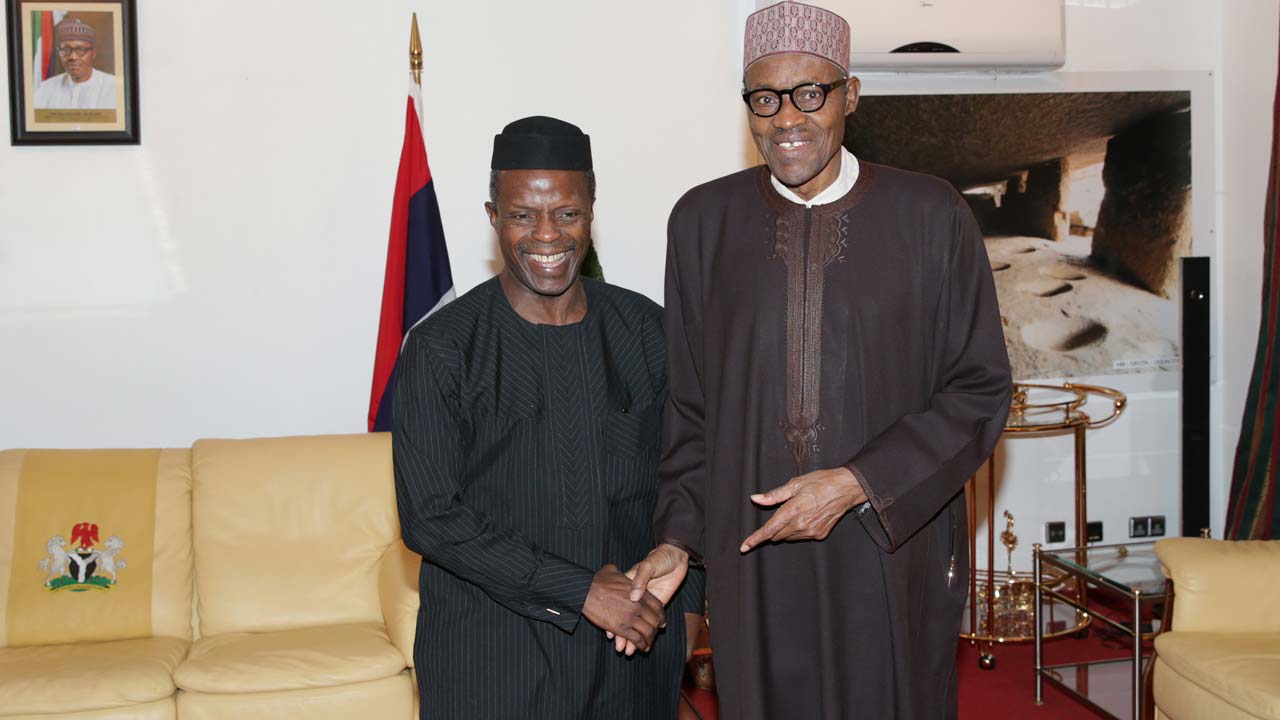- Buhari Meets Osinbajo Over Economy, 2017 Budget
The State House in Abuja yesterday witnessed a flurry of activity three days after President Muhammadu Buhari’s return from about 50 days of medical vacation in London, United Kingdom.
The resumption may douse the controversies over Buhari’s fitness or otherwise to continue in office and the period Osinbajo can act as president.
In a brief statement yesterday, Buhari’s Special Adviser on Media and Publicity, Femi Adesina said the president had formally transmitted letters to the Senate and the House of Representatives, intimating the National Assembly of his return and resumption of work in the villa.
The statement quoted President Buhari as saying “I have resumed my functions as the President of the Federal Republic of Nigeria with effect from Monday, March 13, 2017, after my vacation.”
At resumption yesterday, Buhari met with Vice President Yemi Osinbajo during which the north east debacle, 2017 budget, and the economy, among others, were deliberated upon by the two leaders.
In a brief encounter with State House correspondents after the closed-door meeting with Buhari, Osinbajo said they discussed a wide range of issues for over one hour.
Osinbajo, who was acting president when Buhari was in vacation, said the meeting was specifically to brief the president on a number of issues and how he handled the ship of state while he (Buhari) was away.
“We just had a very long meeting, we are basically trying to bring the president up to speed as to some of the things we have done while he was away. And he has given a few directives on what we should be doing in many areas, the north east, budget, the economy, a wide range of issues.”
Osinbajo, who said Buhari expressed satisfaction with how he piloted the affairs of state during his absence, debunked insinuations that the president was still weighed down and needed more time to rest.
“He is very well, his readiness for work is not in doubt at all. In fact, he is over-ready. He held a meeting with me for over an hour where we discussed a wide range of issues,” he said.
On whether he has formally handed over the reins of power in view of the president’s earlier indication to do a “follow-up” on his health status within some weeks, Osinbajo said: “Oh yes! I’m back to my regular position as vice president. I think the president, as you know, has always given me several responsibilities.
“What we must recognise is that the way this administration works is that it has always been a team work. Very little is done without the president’s clearance. So, generally speaking, even responsibilities that are mine constitutionally, we have full discussions on them. We have full agreements on all of those issues.
“It is necessarily delegation, yes in some cases delegation, but by and large practically everything I discuss fully with him and have his endorsement before we are able to go on and do anything at all.”
The Speaker of the House of Representatives, Yakubu Dogara, yesterday received the correspondence from Buhari on his resumption of duty.
In the letter delivered by the President via his Senior Special Assistant on the National Assembly Matters, Abdulrahman Kawu Sumaila, Buhari noted: “ In compliance with Section 145 of the 1999 Constitution (as amended), I write to intimate the House that I have resumed my functions as the President of the Federal Republic of Nigeria with effect from Monday, 13th March, 2017, after my vacation.”
Dogara said he would read the letter to his colleagues during plenary session when the House reconvenes today. According to him, the House will ensure a harmonious relationship with the executive arm aimed at addressing the challenges bedeviling the polity.
“We have seen, to some extent, some forms of understanding between the National Assembly and the presidency. We promise that we will cooperate more than we fight. Like I said before, we will always fight and that has been the practice in all climes and ours cannot be an exception but we will cooperate more in the interest of our people rather than fight.”


 Naira3 weeks ago
Naira3 weeks ago
 News4 weeks ago
News4 weeks ago
 Naira4 weeks ago
Naira4 weeks ago
 Naira3 weeks ago
Naira3 weeks ago
 Travel3 weeks ago
Travel3 weeks ago
 Jobs3 weeks ago
Jobs3 weeks ago
 Naira3 weeks ago
Naira3 weeks ago
 Investment4 weeks ago
Investment4 weeks ago





























